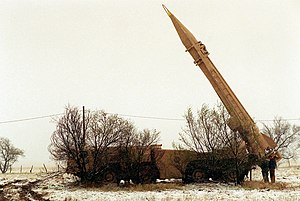U. S. Arms Control and Disarmament Agency
 A Scud missile |
|
| Agency overview | |
|---|---|
| Formed | September 26, 1961 |
| Preceding agency |
|
| Superseding agency | |
| Agency executive | |
| Parent department | United States Department of State |
The U.S. Arms Control and Disarmament Agency (ACDA) was established as an independent agency of the United States government by the Arms Control and Disarmament Act, Pub.L. 87–297, 75 Stat. 631, enacted September 26, 1961. The H.R. 9118 bill was drafted by presidential adviser John J. McCloy. Its predecessor was the U.S. Disarmament Administration, part of the Department of State (1960–61). Its mission was to strengthen United States national security by "formulating, advocating, negotiating, implementing and verifying effective arms control, nonproliferation, and disarmament policies, strategies, and agreements."
In so doing, ACDA ensured that arms control was fully integrated into the development and conduct of United States national security policy. ACDA also conducted, supported, and coordinated research for arms control and disarmament policy formulation, prepared for and managed U.S. participation in international arms control and disarmament negotiations, and prepared, operated, and directed U.S. participation in international arms control and disarmament systems.
In the 1970s emphasis of the agency was placed upon gaining an understanding of the strategic weapons capabilities of the Soviet Union and People's Republic of China. The electronic reconnaissance capability of the United States was expanded through federal agency research and private contract research, utilizing radio frequency as well as optical technologies. The theory of this mission was that a clearer understanding of other nations' strategic capabilities was an important initial step in prevention of nuclear war.
...
Wikipedia
